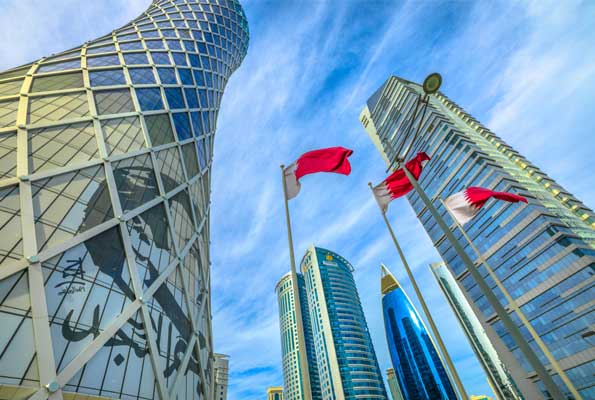With investments reaching QAR82 billion, Qatar’s real estate business has emerged as the Gulf nation’s second fastest-expanding sector after hydrocarbons. To oversee the growth of this business, the country has established a legal and executive framework.
According to official figures, the Qatari real estate market witnessed USD 125 million in sales contracts in the second week of June 2023 alone.
From May 28, 2023, to June 1, 2023, QR 453,314,728 (USD 124.5 million) worth of real estate transactions were recorded with the Real Estate Registration Department at the Ministry of Justice.
According to the department’s weekly bulletin, the list of real estate assets offered for sale comprised vacant lots, houses, apartment buildings, apartment complexes, and commercial structures.
The municipalities of Al Rayyan, Al Daayen, Al Wakra, Doha, Al Shamal, Umm Salal, Al Khor, and Al Thakhira were home to the majority of sales operations.
From May 21 to May 25, 2023, QR266,634,542 (USD 73.3 million) worth of real estate sales contracts were recorded by the government authorities.
HNWIs To Splurge In 2023
According to a Knight Frank survey of High-Net-Worth-Individuals, 30% anticipate investing at least USD 1 million in Qatar’s residential real estate market by 2023.
Destination Qatar research also concluded that tourist influx has significantly increased demand for luxury properties in the country.
According to the survey, Qatar has a strong economy because of its high standard of living and thriving tourism sector, with its GDP per capita being the fourth highest in the world at an estimated USD 69,000.
The “Destination Qatar” poll, carried out in collaboration with YouGov, aims to map the investment habits of 30 HNWIs with a total net worth of more than USD 155 million who reside in Qatar.
According to poll results, 37% of HNWI respondents said their primary investment emphasis was in the residential sector, with the office sector coming in second with 33%. By receiving votes from 23% of HNWI respondents, the retail industry came in third place.
The influx of foreign HNWIs into Qatar has boosted the market for luxury properties and the country’s high-net-worth population.
Qatar’s population has increased by 60% since 2013, and 850,000 new jobs added at the same point in time, which is in line with the expanding demand for residential real estate.
Also, indicating the rising trend of HNWIs relocating to Qatar, rent in the nation has climbed by almost 25% since 2022, while yields have reached 6.4% for flats and 4% for villas.
According to Adam Stewart, Partner and Head of Qatar for Knight Frank, the significant growth of Qatar’s housing market is evidence that the nation’s critical infrastructural investments undertaken before the 2022 World Cup are paying off.
Lusail has become the preferred abode of HNWIs with individual average real estate budgets of USD 2 million due to its proximity to Doha.
The Marina and Waterfront are the most well-liked areas of the city, according to 71% of respondents polled for the “Destination Qatar” study.
A Successful Real Estate Forum
According to suggestions at a nationwide specialized seminar, Qatar needs a national real estate funding strategy to support industry growth.
Following the Qatar Real Estate Forum, where 1,500 international leaders, decision-makers, and executives participated, the Ministry of Municipality made the suggestions public.
According to a statement from Qatar’s state news agency, the nation’s real estate policy should offer incentives to investors, innovative housing financing choices, and open ownership to foreigners to strengthen the sector.
It was also observed that the Gulf Cooperation Council (GCC) countries’ real estate markets have a lot of potential because of the region’s advantageous features, including geographic diversity, accessibility, the presence of security, and tourist attractions.
The two-day forum, the first in the nation, featured 12-panel discussions and workshops and 35 keynote speakers who discussed various real estate-related issues.
Conclusion
The Qatari real estate market is thriving, with investments reaching QAR82 billion and sales contracts totalling USD 125 million in just one week. The government has established a legal and executive framework to oversee the growth of this sector, and the municipalities of Al Rayyan, Al Daayen, Al Wakra, Doha, Al Shamal, Umm Salal, Al Khor, and Al Thakhira are home to the majority of sales operations.
There is also a significant increase in demand for real estate in Qatar, particularly in the luxury market, from both domestic and foreign investors. The influx of foreign HNWIs into Qatar has boosted the market for luxury real estate properties, and Lusail has become the preferred abode of HNWIs due to its proximity to Doha.
A national real estate funding strategy is suggested to grow the industry, and there is potential for the Gulf Cooperation Council countries’ real estate markets.



